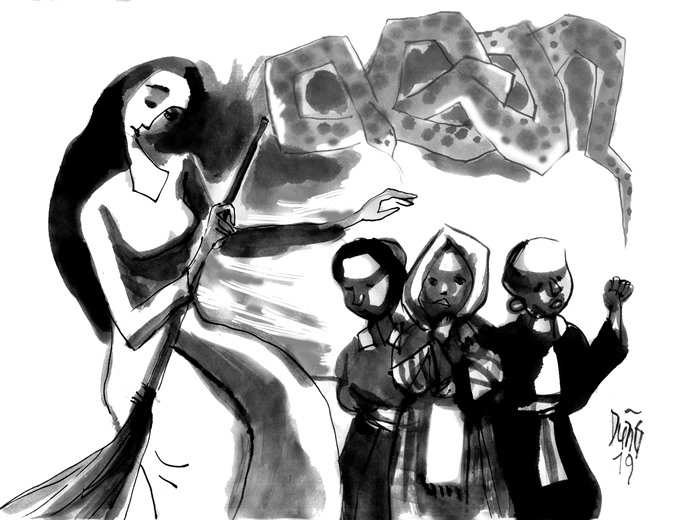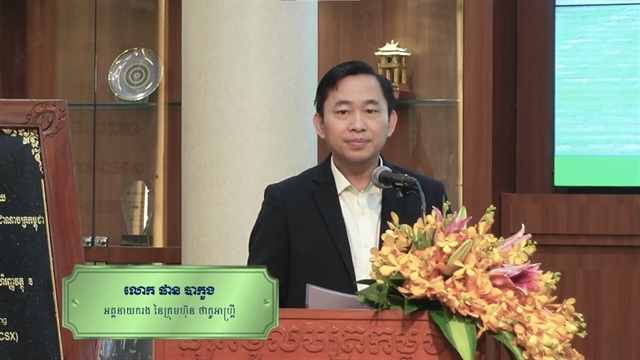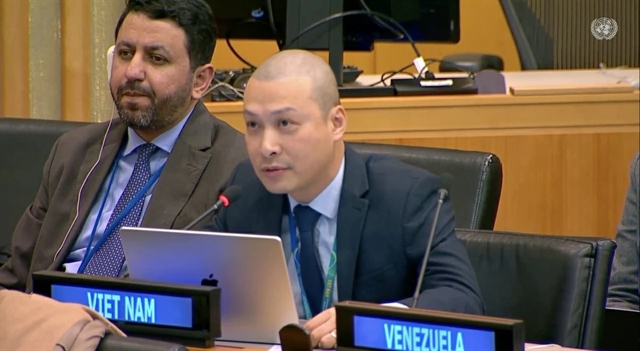

A short story by Du An
 |
| Illustrated by Đỗ Dũng |
By Du An
“Last night, a snake crept onto Lâm’s bed,” someone started. “Oh my god. She felt something slippery, threw off her blanket, then jumped up and down. She was very lucky. If that snake had bitten her, we would have been at her funeral today.” Another said, “Where is that snake now? Its meat will be great for a feast.” “There’s nothing left. It was smashed to powder.” “Who smashed it?” “Who else but Lâm? There isn’t anybody else under her blanket.” “Biên might have come back home at midnight, who knows.” “We know. Mường Song is as small as a palm of hand, we know everybody who comes and goes…”
The snake in this conversation at the three-way crossroads sounded even more real than the actual snake and Lâm. Some stood while others sat, and everybody gossiped enthusiastically. As the conversation was running out of steam, a man suddenly sighed, stood up then walked away. A woman wondered aloud, “Why haven’t I seen any corn vendors yet?” Nobody answered, the woman’s corn talk didn’t seem relevant. Right then, Lâm was coming downhill. Everybody rushed out and stared. Lâm greeted and said, “I’m going to the market to buy a few items for school.” Her voice and demeanour seemed calm, showing no trace of a fearful encounter with a snake. A woman asked, “Lâm, did a snake creep inside your blanket last night?” “Yes,” Lâm answered. “What’s the matter?” “Nothing,” the woman replied. “But I have goosebumps thinking about it.” “It was nothing actually,” Lâm recalled nonchalantly. “When I woke up in the middle of the night, I found something crawling and wiggling under the blanket. I grasped and pulled it out. It was a snake.” Everybody looked at Lâm in awe. “Was it a cobra or a krait?” another asked. “I flung it away too quickly to see,” Lâm said. “Ah, but this morning when I picked up the dead snake to throw into the trash bin, I noticed that it had mouldy skin and there were stripes on its back. Its head was completely crushed so I didn’t see anything.” “You were very lucky. When Biên returns, you must throw a big party to celebrate your escape. Remember to invite us.” “I don’t know when my husband will come home,” Lâm said, before wishing good day and leaving for the market.
As Lâm walked away, all eyes followed. Her hair was long and light. “How beautiful and fertile she looks,” somebody said. “Why isn’t she with child yet?” Another answered, “Her husband has to work far away as a border guard, so they hardly have any time together.” Lâm was reaching the end of the street and couldn’t hear how the gossip had turned from the snake to herself.
The sun had risen early, the air still felt a little cold. The steam from the rain the night before and the dew melted away fast. In an instant, the town transformed into a hazy silvery jet. The forest seemed to grow out from the rooftops and the street looked higher.
*
Lâm worked as a teacher in Mường Hống mountain village. Her first tasks every day were to wake up, sweep the classroom, then strike all the drawers with the broom to scare snakes away. Afterwards, she would carefully beat all the bushes outside with a stick. She would wait for a while, until some snakes crawled out, before returning to the kitchen. She would boil corn or potatoes or roast cassavas or simply start a fire without cooking anything.
Lâm learned to take extra care after a terrifying incident. That day, tree branches were laden with frost and the winds whacked the walls, swirling and howling. It was freezing, so not until 9am did class start. The teacher and students shrunk up, their teeth chattering. After the students finished colouring their letters, Lâm gave them a break. The teacher and students flocked around a flaming fire at the end of the classroom. After a while, all their cheeks reddened and their bodies relaxed. Lâm recalled her childhood in her home village when she didn’t have warm clothes or firewood. “How could you cook rice without firewood?” one student exclaimed. “We used rice stubble and straw,” Lâm said. “There would be too much smoke, how could you see the pot?” “There wasn’t any smoke, your hands must stroke the fire the right way.” Lâm sat up to demonstrate with nimble hands. The students laughed with admiration and said, “You look nimble like a snake crawling on a tree.” Lâm said “I’ll teach you someday.”
Lâm was erasing the blackboard for a picture storytelling assignment when some student cried, “Snake!” The eraser cloth dropped out of the teacher’s hand. The snake had crawled onto a desk. The students trembled in fear. The snake didn’t fear anything, tiled its head and looked around, puffing and panting with its forked tongue. In a different situation Lâm would have fainted. Yet, right then, her motherly instinct surged. In an instant, Lâm flung her bag straight onto the snake. The bag hit the snake’s back. The snake startled and dropped onto the ground, then crept across the lecture platform. Lâm snatched her ruler and repeatedly beat the snake on the head.
It died. The teacher and students sweated in panic. Lâm regained her composure and ordered, “Let’s check all the drawers. Your jumping has startled the snakes.” The girls were still huddling in a corner. The boys had stopped feeling frightened and started to pound on the desks. Some checked around the drawers with their hands. “Teacher, I’m catching a snake,” one student exclaimed. The boy tried to pull out the snake which showed its long slippery body. “Drop it!” Lâm shouted.
Lâm quickly ran out, broke off a branch, then returned to strike all the drawers with the stick. Three more snakes crept out, showing their reddish backs and tails, and then disappeared.
The class resumed, but snakes remained in everybody’s mind. “Snakes must love studying indeed,” Lâm tried to joke. “No, they are the most cruel creatures in the forest,” some student objected. “They lie in the drawers waiting to bite us.” Another chimed in, “They’ve come just because of the warm atmosphere created by the fire and our presence.” The students stirred up, warming the classroom. Though she forced a cheerful tone, deep in her heart Lâm felt fearful for her students’ lives. She couldn’t bear it if someone got hurt. The parents worked all day in the paddies, entrusting their children to her care. Without saying it, they expected her not only to teach them but also to protect them.
*
The following morning, news of the incident reached the border post. No sooner did Lâm announce break time and go back to her room than a border guard arrived on horseback. It was Biên, a lieutenant who spoke beautifully and sang sweetly that Lâm knew after several visits to the post with her colleagues but had never talked to. As he stood at the door, Lâm greeted him and invited him in. He inquired about the snakes. Lâm drew back her shoulders, telling him how frightened she was. He told her to stay cautious, calm and resolute in this region frequented by venomous snakes. “I’m just afraid they will take revenge on us,” Lâm spurted out, wondering why she said it. “Snakes aren’t human,” Biên assured Lâm as her face was turning pale. “But I’ve read somewhere about snakes’ revenge,” Lâm protested.
…One day, the scribe asked his students to cut the grass in the garden to build a classroom. At night, he dreamed about a woman leading a band of children begging him to give them a few more days to move out. The scribe agreed. When his students beat some snakes to death as they were cutting grass the following day, the scribe suddenly understood the meaning of his dream. But it was too late. That night, when he was preparing his lecture, a snake crept on a ceiling beam, puffed with its tongue and dropped blood that sank through several pages in his book…
“Is it the story?” Biên stopped reciting and asked. “Yes!” Lâm said with childlike excitement. “So did the snakes come for revenge afterwards?” “Yes,” Biên said. “They came in droves. But the teacher and students were prepared. They used sticks to beat around all drawers and bushes. The snakes showed themselves and were scared away. Nobody was hurt.” “You’re talking about me!” Lâm exclaimed. “Not at all,” Biên insisted teasingly. “You must have excelled in literature in school,” Lâm observed. “Yes,” Biên said. “I’m a romantic so I chose to become a border guard to be able to live among the clouds and winds.” “You’re living your dream then,” Lâm said. “I don’t have big dreams like you. I came here and now I feel fearful, like in a horror movie.”
“What a girl,” Biên thought. Suddenly he flicked Lâm’s cheek. Lâm’s face grew rosy. She looked down, Biên was spellbound…
The snakes turned out to be the harbinger of marriage. After the wedding, the border guards and villagers built a love nest for Biên and Lâm next to the classroom. For two days straight, no snake appeared. Yet one morning, while Lâm was cooking in the kitchen, she heard Biên joke, “Hello comrade. This is my house. If you behave, you are welcome here. Oh, you are puffing with your tongue to threaten me. What meaningless cowardice. That’s enough. Go away…”
Lâm picked up a piece of firewood and emerged from the kitchen. The snake straightened its neck, waving its head. Its eyes stared straight at Lâm. “You can’t cast your spell on me,” Lâm said aloud. “I’ll beat you on the head, then fling you down the mountain. Your kind will be warned when they find your corpse.” As Lâm raised her hand, Biên grasped her wrist. “You’re too nice,” Lâm raised her voice. “You can’t be home all the time to protect me, can you?” “No,” Biên answered. “But what do you think will happen after you kill it? Tomorrow, or the day after, can we sleep in peace? If we kill one, there are still thousands of snakes out there to come to startle us.” “Stop,” Lâm said. “You’re backtracking. I thought you were a strong man, but you are just a coward.” “Coward! Say it again,” Biên pursed his lips and bit his teeth. For a minute, Lâm held her breath, anticipating a slap. Biên, whose body was growing tense, didn’t raise his hand. But through his mouth, he blew out a jet of cold air, like a snake. Lâm stepped back, instinctively.
The two were too angry to speak at dinner. At night, after they lay in bed with their backs against each other for an hour, Biên turned around and held his wife with his arm. “I’ll have to leave tomorrow, let’s make up teacher. I’ve been a bad boy” he pleaded. Lâm tried to shake Biên off, but his clasp only tightened. Lâm struggled, then gradually yielded. “It’s not too far from here to your border post,” she objected. “It’s near but far at the same time,” Biên said. “Don’t be sentimental,” Lâm continued. “I’m not. There isn’t any war, but our situation is dangerous,” Biên said. “Are you talking about your friend Miễn who was killed?” Lâm asked. “Why do you guys who have guns let others kill you with their knives! If I were you, I would aim my gun straight at their venomous heads.” “Calm down teacher, or else your students will run away for their dear lives leaving their shoes behind.” “My students don’t even have shoes to wear,” Lâm said, laughing. Biên stifled her laughter with kisses.
*
In the following month, Lâm felt indisposed. Whatever she ate seemed to stick in her throat. “You’re pregnant,” said the school’s vice-president who visited her class one day. “You’ll vomit at the smell of rice.” “God, I don’t want to die of hunger,” Lâm winced. “You won’t, but giving birth is difficult.”
It was the harvest season, so only five students showed up for class. The day after, only two showed up. And on the day after that, there was only one faithful soul.
Lâm walked up to the paddies to look for her students. She kept walking for seven hours until her feet swelled before she reached her destination. Two students and their parents were overjoyed at the sight of the teacher. The parents said their children loved to go to school very much, but the rice had ripened so every family member had to pitch in to harvest the field quickly. “Your students will return in five days, teacher. The knowledge still remains in your bag, it won’t run away like a dog, so why do you worry?” the father told Lâm. Lâm was used to this reasoning so she didn’t protest. Lâm knew she must proceed slowly, then everything would fall into place.
“Give me a sickle,” Lâm said. “You don’t know how to use it,” the father hesitated. “The rice is higher than you, so when you raise the sickle with your face up, it may cut your cheek.” “I know how to use it,” Lâm assured. “Back in my home village, I also had to work in the field.” The father gave the teacher a sickle, looking skeptical. Lâm immediately put it to use. The sickle moved about speedily while all eyes admired.
It took Lâm and the family only three days, instead of five, to harvest the field. On their last working day, the family ate in the field. There was bacon and vegetables roasted in a bamboo pipe. Lâm ate with gusto.
In the afternoon, the family carried their rice in baskets up to the top of Sam Mountain. From here, if they walked on, it would take them about three hours to reach the village. But it was a dangerous downward sloping path. With a heavy basket on her back, Lâm might slip and fall like a rolling rock.
So the family decided to take extra precaution and walk through the forest, which would take an extra two hours. They planned to rest by a big stream when they reached the cherry blossoms. “Are we there yet,” Lâm asked when the air suddenly fell dark and dense with reeds. Lâm closed then opened her eyes to get used to the dark. Yet no sooner did she open her eyes than she cried out, “Help. Help.”
From the other side of the stream, seven or eight people wearing black clothes and masks carrying sticks rushed toward Lâm and the family. The robbers snatched their baskets, beat them with sticks, and jumped and stamped on their bodies.
Lâm tried her utmost to snatch back her basket but suffered two kicks in the stomach. She fainted. “Are you okay teacher?” the father with a bloody face crawled near, raised her up and asked. “I’m okay. Oh it hurts,” Lâm held her belly writhing in pain for a while until she felt like a hand was pulling her guts out. “Teacher don’t die,” her two students held her, tearing raining down their cheeks.
Lâm tottered home and took a shower. The pain subsided, though clots of blood kept flowing out. Lâm fainted.
Biên came home three days after. “We’ve chased them to the other side of the border,” he informed her. As Lâm kept sobbing, Biên stroked her hair. “We’ll have another child,” he said. “It’s my fault,” Lâm said. “I should have stayed home.” “You did the right thing,” Biên said. “As a teacher, you should live with the villagers. It’s our fault.” “No, it isn’t your fault. I’ve heard your post had handled this gang already.” “Yes, but… Anyway, you should rest now.” What Biên almost told his wife was that the situation on Sam Mountain was complicated. There were many things the border guards didn’t tell the people but had to deal with in secret. Biên wanted to spare Lâm so that she could regain her calm to take care of her students and their future children.
*
Biên waited for Lâm for nearly a month to recover before he suggested that they should move to Mường Song Town. Lâm startled and objected. Biên said he had built a house there, with some money from his parents who were glad to help, plus friends’ support. As for his own savings, they could use them to buy a motorbike. Lâm could drive to class every day, since the distance was a mere 30 kilometres. Lâm insisted that she couldn’t abandon her students who might be bitten by snakes early in the morning before she arrived.
It took Biên a whole night to plead with Lâm. She yielded with the condition that he must give her two weeks to prepare.
On the following morning, Lâm woke up early. She walked to the classroom and stood outside looking in then went to the top of the hill to wait for her students.
It took a while before the first three students showed up. They greeted their teacher and rushed into class to be the earliest to arrive. “Teacher, why haven’t you opened the door yet?” they asked. “You three come here,” Lâm said. “In a few days I won’t be here early, so please take good care of yourselves. Sùng, since you’re hard-working, you can keep the key. Here, try to open the door now. Don’t insert it too deep, just insert over half of the key then turn it gently. Brilliant! Let’s go inside. What will we do now? Sweep the classroom, strike the drawers then beat the bushes. Brilliant again.” Lâm felt happy and excited as she watched her three students carry out their tasks. “There isn’t any snake here, teacher. Let’s go outside,” the students said. In an instant, the bushes outdoors suffered a bombardment as other students arrived, cheered and shouted, and rushed around to check for snakes. “Ah, there is one soil-coloured snake here,” some student exclaimed. “Another green one here,” shouted another. “Have you been here since last night? Go away, you nasty thing.” The students used sticks to beat then fling the snakes away. The snakes bundled into heaps, swirled up high, then dropped down and vanished.
At noon, Lâm instructed her students to clean up the classroom. All sorts of brooms, knives, hoes and spades from Lâm’s house were dragged out for use. Though the classroom was still clean, Lâm told the students to sweep it one more time, remove all cobwebs, then sweep again. All odd bushes outside were also chopped down and cleared away. The students cheered and sweated, forgetting that the sun had risen high, beaming straight down to every crook and corner, leaving no room for snakes to hide.
One week then two weeks passed. The students had learned to execute their tasks as carefully as their teacher. For the moment, Lâm felt assured and could start to think about her own family.
*
Mường Song was empty and quiet. There were only a few kids playing hide-and-seek around a shady dracontomelon tree. Where were all the market vendors? Lâm wondered. It was the harvest season with plenty of grains to sell. Why didn’t they snatch the opportunity to make some money?
Big store owners didn’t seem to care about business either. A customer had to call noisily for a while before an old man who had been resting in bed appeared and said, “My children have all gone. I don’t know how to sell things.” “Where are your children?” the customer asked. “They have gone to Mường Hống Village,” the old man answered. “What on earth for? Do they plan to trade leaves now?” “I don’t know, but the whole town is going there.”
According to a few war veterans in town, it turned out that the whole town was flocking up to the mountain to find snakes to sell.
It had all started with the snake that “crept onto Lâm’s bed”. As Lâm and others were talking about it, a man called Luận happened to walk by and overheard them. He was overjoyed and immediately went up to the garbage dump to search for the dead snake. He intended to dig it up, chop it into pieces and eat it with a whole bottle of wine. However, as Luận was carrying the dead snake away, a passer-by saw him and perked up at the sight of the snake. The stranger offered to buy it. One million dong, Luận joked. He didn’t expect the stranger to pull out two 500,000 bills to pay him on the spot. Luận thought he was dreaming and quickly took the money. Then he asked his customer, “What are you going to do with it?” “This is a horned snake,” the stranger said. “Steeped in wine, its meat will give robust rhino-like health.”
The whole town later sat down to dissect Luận’s luck. Up until now, the town had never seen this type of snake. It wasn’t a coincidence that it had crept into Lâm’s blanket. Possibly, no, undoubtedly, it had followed Lâm from Mường Hống back to town. It had climbed into Lâm’s motorbike and got stuck under the saddle. When the teacher went home, the snake, which was hungry, crawled out to search for food, and snuggled into the blanket mistaking it for a cave. The snake must have come from the deep forest near the border which was its natural habitat.
So a group of people flocked to Mường Hống to find snakes. Snakes were carried away in bags and iron cages.
Back at the school, the students felt liberated and at break times, they frolicked around.
Peace rained down on the mountain village. In the paddies and the forest, boys and girls started to sing, something they hadn’t done since the robbery.
On the last day, one person in the group asked teacher Lâm, “Are you happy now?” “I’m still worried,” Lâm said. “Why? Every snake has been caught,” the person said. Lâm said, “I don’t know. Everything feels a little slippery.”
When the snakes arrived in town, the snake trader was asked to meet the local government.
The government passed down an order that forbade people from hunting and trading wild species. The government then searched and confiscated all the snakes that had been caught.
The snakes with their small eyes and waving tails were whisked away in government trucks.
*
Lâm was pregnant again. She waited for two months to be sure before informing Biên. Biên was thrilled. He took no chances and asked the school president to give his wife a one-week break. He also took his annual leave to take care of his wife.
Having three people in the house felt joyous and strange. Every night Biên held his wife and talked. Only late into the night after Lâm yawned then fell asleep did Biên quietly leave to sleep on a single bed close to the door. In the morning Lâm woke up and asked why he had to sleep separately. Biên laughed and said he didn’t want to trample on his child.
With her husband home, Lâm could sleep soundly until the morning. She slept without dreaming or startling. For three nights straight. Then on the fourth night, she felt something crawling inside. Lâm shouted, Biên jumped up and swooped down. Too late. A snake which was as big as his biceps speedily crawled up onto a ceiling beam and vanished through the roof.
Biên moved to sleep on Lâm’s bed, but neither could go back to sleep. Biên told his wife again and again that she must not tell anyone. “It would be too cruel to keep silent. That snake will creep into another house to make trouble again,” Lâm said. Biên said, “I don’t want to scare people.” Lâm said, “There isn’t anything to be scared of. I’m not scared.”
On the following day, despite Biên’s earnest and even angry entreaties, Lâm headed back to Mường Hống.
“I’m worried about my students, there are still many snakes out there,” she told her husband. Biên stood still for a while then got on his bike to race after her. After just a few days of break, Lâm had startled him. Snakes seemed to be crawling everywhere.
Translated by Thùy Linh




